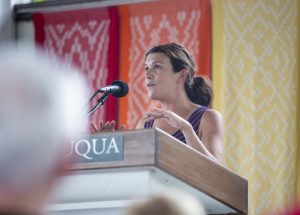
When Stuart Siegel received a call from his wife Emily with the news she had received a raise at work, the two decided they would save up their money and take a road trip the next year. Little did they know that a conversation with a geomancer they would meet on their first stop of that road trip would lead them to the adventure of a lifetime.
“Emily is not interested in psychics at all, but this guy was nice and there was something about him,” Siegel said. “So she said, ‘All right, we’re on a road trip. There’s something waiting for me in Arizona.’ ”
Emily and Stuart Siegel, directors of the Sonoran Desert Inn & Conference Center, joined James Fallows for Week Two’s interfaith lecture theme, “Common Good Change Agents,” with a discussion of their work in the small town of Ajo, Arizona. Their lecture was titled “How Many Shrimp Tacos Does it Take to Save an Impoverished Former Mining Town?”
Ajo was a copper mining town built in the middle of what the Siegels described as a “desert island.” The closest movie theater is 80 miles away, and it takes a total of five hours roundtrip for the Siegels to go to a prenatal appointment.
The town had once flourished, but after the copper mines closed in 1985, the economy fell apart. Businesses failed, and the population went from 10,000 to 1,500 overnight, as most families left to seek employment elsewhere, leaving Ajo a ghost town. Most remaining residents are of Mexican, Tohono O’odham — a Native American tribe — or Anglo heritage.
Stuart said that when the only two physic people they knew told them they had a life waiting for them in Arizona, they listened.
— The Chautauquan Daily (@chqdaily) July 4, 2019
“(The) town is arranged around a beautiful 100-year-old Spanish colonial plaza; there’s Moorish tile details on all the roofs,” Emily Siegel said. “A mile south of this plaza is a huge hole in the ground. It is as deep as the Empire State Building is tall. It’s about a mile and a half across. And, this is the former New Cornelia copper mine.”
Originally, the Siegels’ road trip had nothing more to do with Arizona than driving through it — they simply wanted to explore America. Of course, Stuart Siegel wondered what would happen at the end of such a venture. He talked with Emily, and they decided to make a goal for themselves.
“We decided to … indulge a fantasy I’d had since my 20s, of having a retreat of some sort where people could come … and get away from the crazy madness of regular life,” Stuart Siegel said. “So we decided we would dedicate the last month of our trip going around Maine and seeing if there was a moldy camp we could buy for a few bucks, and learn how to use a hammer and maybe start our own little retreat center.”
But after speaking with the geomancer, the Siegels found themselves visiting with Emily Siegel’s friend, Lee, and his parents, in Ajo.
“Before we could even sit down to dinner, Lee turns to us and says, ‘You know, there’s an organization in town called ISDA and they’re opening a retreat center, and I just have this feeling that you should run it,’ ” Stuart Siegel said.
With very little hesitation, the Siegels took the opportunity, telling their family on April Fool’s Day that they were starting a life in Arizona. There, they had their wedding, bought a house, had a child and currently have another child on the way.

In Ajo, the Siegels began volunteering at a hotel. Four years after this volunteer work, the Siegels would find themselves the directors of the Sonoran Desert Inn & Conference Center.
This inn was a result of a surge in energy that coursed through the town in the ’90s. After the economic downturn caused by the copper mines closing in the ’80s, “snowbirds” started to visit in the winter.
“Some clever person branded Ajo as (the place) where summer spends the winter, and there were big billboards around southern Arizona with that slogan, and there were ads placed in little northern newspapers,” Emily Siegel said. “And, a lot of the retirees that discovered it … wanted to buy a $20,000 bungalow and fix it up, drawn to Ajo’s remoteness and the low cost of living and the creative opportunities they imagine might come with it.”
With the attention that Ajo was receiving, a nonprofit, tri-cultural organization was established: the International Sonoran Desert Alliance. ISDA’s mission is to preserve the economy, the culture and the environment of the Sonoran Desert of Ajo, and the Siegels believe they have done wonderfully. They’re particularly pleased with a historic preservation project in which the ISDA purchased 15 acres of the historic town center and renovated all of it, including the elementary school that is now known as the Sonoran Desert Inn & Conference Center.
“It’s a 21-room hotel and historic elementary school. It kind of feels like a Mexican hacienda,” Emily Siegel said. “It’s got the tile roofs; there’s a huge pomegranate orchard in the courtyard. We have our guest rooms, meeting spaces, a commercial kitchen and this big urban farm right in the middle of it all.”
Despite the beauty and excitement that has come with directing the retreat center, Emily Siegel said there are many problems in the region. As Ajo is only 39 miles away from the Mexican border, it is considered a border town and is heavily guarded by law enforcement. It’s also in a particularly dangerous stretch of the Sonoran Desert. The migrants, and the region, Emily Siegel said, is in the midst of a humanitarian crisis.
Based on the region’s current political and social landscape, as well as Ajo’s history and mix of cultures, Emily and Stuart Siegel generated a mission statement for the retreat center.
“So, our purpose statement: to promote Ajo as a destination by providing visitors and locals with rich cultural and recreational experiences that in turn promote the economic development of the region,” Stuart Siegel said.
The Siegels work to follow this statement through hosting retreats and local events, bringing together visitors and Ajo locals who may otherwise be reluctant to engage with newcomers.
“We started a dinner series called ‘Tasty Tuesday’ and we did that all this year,” Stuart Siegel said. “About 50 to 100 people show up every week and the most popular (dish) has been shrimp tacos from Luis Castillo, who drives an extra hour and a half down to the beach at Puerto Penasco, picks up shrimp there, and brings it back.”
“Almost everything in our gift shop is made within 100 yards of our office,” says Stuart.
— The Chautauquan Daily (@chqdaily) July 4, 2019
Castillo’s tacos have become such a hit in the town, he has made $6,000 this year alone. As a result of Tasty Tuesdays’ success, and the success of other initiatives, business has been great for the Siegels.
“We’ve hosted over 10,000 visitors in the past 4 1/2 years,” Stuart Siegel said. “That’s 10,000 people that buy dinner in town, that go to the supermarket, that fill up their gas, that spend money in town, in other businesses, and also have a wonderful experience that they then go home and talk about and tell other people about, changing other people’s impressions of this little town in the middle of nowhere.”
There are financial limitations, Stuart Siegel said, but the money that is made goes directly back into the community and to their employees.
“We’ve taken in over $1.3 million in revenue and most of that stays in town, and it goes into other people’s pockets; our staff caterers, local artists who make different crafts and things that we sell in our gift shop,” he said.
The Siegels are currently in the process of bringing the minimum wage up to $15 an hour for their employees. To assist in that goal, the Siegels have set up workshops where employees can demonstrate their talents and earn money while doing so.
One of their employees, a night shift manager, did a workshop on creating delicate paper with wild flowers in it. Now, that manager gets paid to make that paper for other people. Another employee held a Native American cooking workshop; it was so successful that he is now a workshop vendor for the Siegels.
“We try to give what we can, and we try to provide opportunities for people to come and see things and learn,” Stuart Siegel said. “We try to tell everybody that whether you’re running a workshop or cooking a meal or even cleaning a toilet, that’s part of Ajo’s growth, part of Ajo’s success.”
The Siegels presently rely on buzz to bring people in — word-of-mouth compliments and kind words that motivate people to come to the retreat center and see what Ajo is all about.
“So how many shrimp tacos will save Ajo? Well, that’s a trick question,” Emily Siegel said. “Selling shrimp tacos and hosting interesting events are not going to save this place. And many people, including us, would argue it does not need saving. … We see the actual value in our work as all of these small, human interactions that we create every day … We want the Sonoran Desert Inn to be a spark; we want it to be a catalyst for broader positive change in our community.”
Emily concludes by saying to help people can “seek out connection over consumption.”
— The Chautauquan Daily (@chqdaily) July 4, 2019




